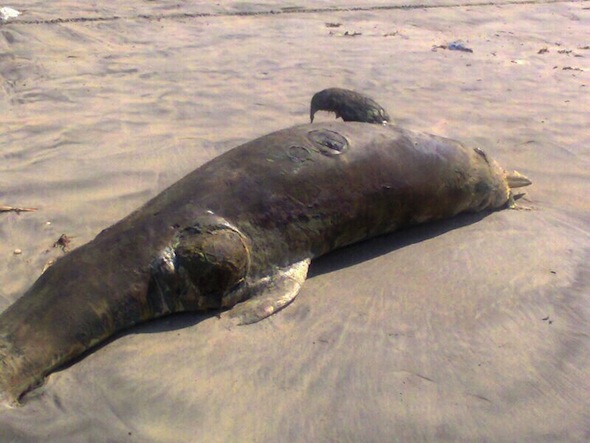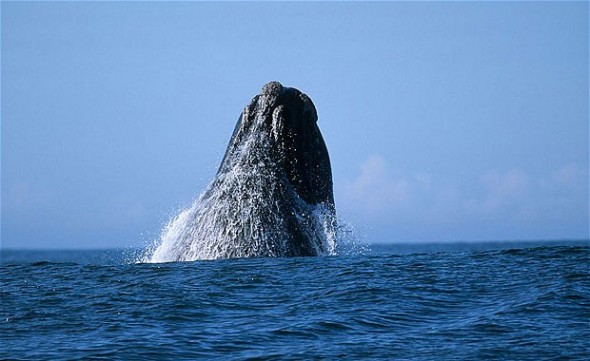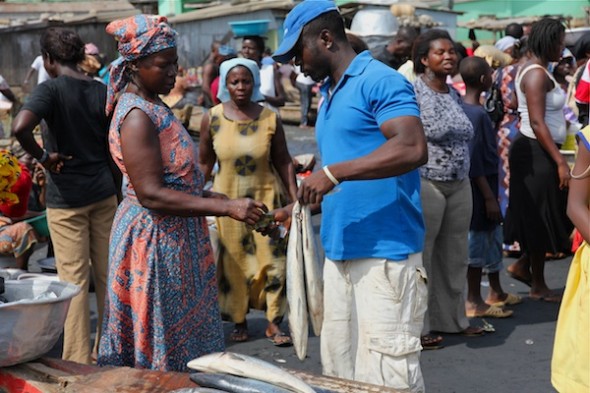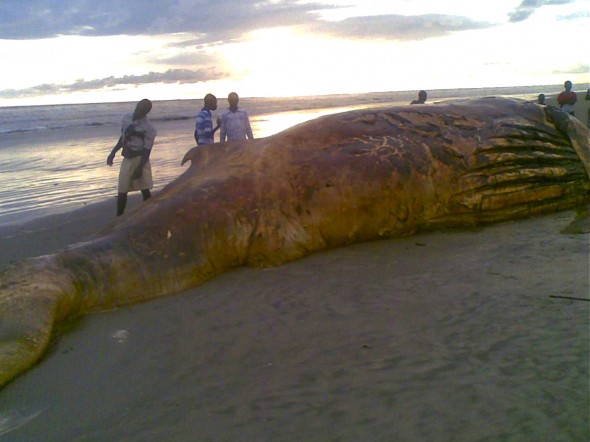Oil vs. fishing in Ghana — the conflicts continue
It has been ages since I’ve posted anything here (more on that below), but it seems that nothing much has changed — at least not for the fishing communities of Western Ghana. I first reported on conflicts between fishermen and Ghana’s new oil industry more than three years ago. Since then, oil exploration and drilling have increased, and the situation for fishermen has deteriorated. In the last few months three reporters have contacted me to talk about conflicts between fishing and oil.
Marine mammals continue to wash ashore in Ghana’s Western Region

October 21st, 2013: the 19th marine mammal to wash ashore in Ghana’s Western Region since 2009. Photo: Friends of the Nation
From Friends of the Nation, Takoradi, October 23, 2013
The washing ashore of marine mammals in Ghana is still not stopping. On October 20 and 21, 2013, two more mammals were found dead at the coast of Asanta in the Ellembelle District in the Western Region. These carcasses present the 18th and 19th incidents respectively within the last four years. Citizens in the coastal areas are trying to correlate these unfortunate events to the offshore oil and gas, since the production started around the same period (2009). Two dead mammals after each other within just two days caused a shock amongst locals. People in the coastal community are asking for answers.
A deaf whale is a dead whale

Whale off the coast of South Africa. Photo: http://www.telegraph.co.uk
That’s the title of a new report released today by conservation group, Oceana. The report, which focuses on U.S. oil exploration, shows, “that marine life and coastal economies along the Atlantic Ocean are threatened by seismic airguns used in testing for offshore oil and gas. The United States government itself estimates that the use of seismic airguns along the East Coast – an area twice the size of California, stretching from Delaware to Florida – will injure and possibly kill 138,500 whales and dolphins, and disturb necessary activities for millions more.”
Seismic testing doesn’t just happen in U.S. waters. Read Seismic tests enrage ecowarriors about environmentalists’ outrage when South African authorities admitted that “preliminary seismic tests had been ‘quietly’ conducted between the Port Elizabeth and Jeffreys Bay shorelines two weeks ago.”
More on South African drilling prospects (from an industry perspective) from Offshore magazine: Deepwater drilling on the way off South Africa
Greenpeace was already raising the alarm on the dangers of seismic testing ten years ago. But alas, the rate of offshore exploration has only grown since.
Offshore drilling, noise and whale deaths: is there a connection?
While working in Ghana last year, I learned that an unusually high number of dead whales had washed ashore since the start of oil drilling. I talked to several local environmentalists who feared the deaths were connected to the country’s oil industry but had no resources to investigate. Without offering any details or study results, the Ghana EPA declared the whale deaths were unrelated to the oil industry.
Although there had been no significant oil spills in Ghana, another form of pollution, which may have played a role in the whale deaths, was ongoing yet invisible: Noise pollution. Shipping and drilling are two known causes of significant underwater noise. Noise pollution — especially when it’s below the ocean surface — doesn’t get much attention. But as a recent article in the New York Times points out, the world’s oceans are increasingly noisy and the impact on marine life, mammals in particular, may be devastating:




